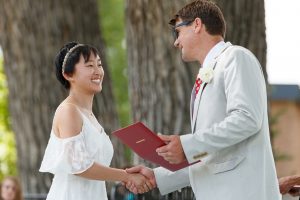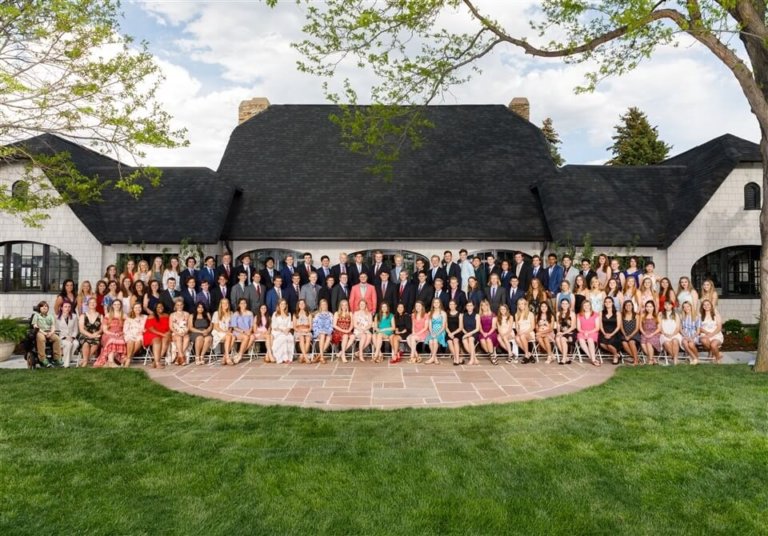Remarks at Commencement 2017

When you type the words “fast paced world” into Google, you will get 59 million hits in .62 seconds. There is no doubt that our world is moving at a frenetic pace. Collectively, we feel this. As we have broadened our understanding of the world, humans have an almost insatiable desire to try to experience everything we can discover. As a result, we move quickly in our lives—perhaps too quickly. You have lived through extraordinary changes in American society since you arrived on this Earth. Before you were born, no one knew what a USB port was. No one texted or tweeted. Netflix rented DVDs via the US postal service. YouTube, Wikipedia and Google didn’t exist. The computer power of what would become a smart phone was still housed in massive desktop computers.
The world became a more dangerous place in your lifetime, as well. Around the time of your birth, there was domestic terrorism like the Unabomber and the Oklahoma City bombing. By the time you were infants, the US was attacked on 9/11. For most of your life, you have mainly known only two presidents, and our nation has been involved in continual war. You have always had to take your shoes off at the airport. It is also interesting to note that bipartisanship in Congress has been basically non-existent for most of your life.
Yet, despite the many challenges we face as humans, there have been social and economic movements that foreshadow a more optimistic vision of the future. Look at nearly any TED Talk, and one can emerge with some inspirational, new idea about how to make our world a better place. The rate of change is also driving innovation that will make our lives better. I’ll bet I speak for every educator on this campus: we do our work because we believe in you. And we do our work, because we believe you will make this world better. Believe it or not, we actually hope you will take any adversity you may have experienced at times during your education and use that to motivate you to inspire change. We know you are capable, motivated, highly intelligent, and ethical.
But to truly make our world better, I think we also need to understand ourselves. We need to know who we are and who we want to be. What is your ethical or moral “core?” What values do you stand for? Who do you want to serve in your life? Do you just want to serve yourself? These aren’t simple questions that are easily answered. Most healthy, thoughtful adults spend their entire lives wrestling with their purpose on this Earth. Art, literature, philosophy, science, or religion would not exist if this weren’t the case. It is a fundamental part of being human. So how do we grapple with these big questions in a world that is constantly changing?
My main advice for you today is to: Slow down. Trying to keep up with the fast pace of modern life will not bring you the kind of understanding you need to be a healthy and happy adult.
You are part of a generation of students that has largely been over-scheduled. CA has contributed to this in ways that are both good and bad. That over-scheduling has led you to find your talents and passions. There is an irony here. As I hand you your diplomas in just a few minutes, I am about to say a few words about each of you that describes the many amazing things that each of you has accomplished during your time here. We have asked so much of you, and you have responded with energy, commitment, and dedication. I have just one more request…
As you go through life, and particularly, before you go to college, take some time to slow down and reflect.
As Kierkegaard said, “Life can only be understood backwards; but it must be lived forwards.” I urge you to take time and think about your path, where you have been, and where you are going. How does one do this in an age of constant distraction? You can be like David Bowie who once described his process for self-understanding: “Sometimes you stumble across a few chords that put you in a reflective place.” Or you can be like the great naturalist John Muir, “Into the forest I go to lose my mind and find my soul.”
As you know, I love the outdoors. I am always dreaming of adventures: of canyons I want to explore and mountains I want to climb. As the temperature has warmed, I’ve been getting out for quick rides on my mountain bike. From campus I can get down the Bear Creek Trail. In past years, I’ve cruised by, trying to work my way to Morrison and Red Rocks, before sprinting my way back to campus for my next meeting or an event at the school. But for some reason this spring—and I am not clear why—I’ve been just appreciating the beauty of that creek. Less than a mile from our campus, you can access a trail that will take you through a pretty stunning riparian environment: bird-life galore and beaver dams, coyotes. I found myself stopping more just to appreciate the beauty.
As I started to slow down a bit, I started following that beauty back to our campus…. I remember when I first met Bob and Salty Welborn. Bob grew up in the house behind us that was his family’s farm. In a 2009 speech that Bob gave, celebrating the Welborn House, he noted, “This property at one time agricultural land…. In these days when nature is so greatly threatened by technology as a panacea, here at CA young people can experience in the educational process the beauty and vitality of nature.”
Bob’s father built the house behind us. When I met Bob and Salty, they were in their late 80s. They shared with me the story of the Bear Creek Valley, which—before Hampden Avenue was built—was a beautiful agrarian area. To the east of Welborn were fields upon fields of sugar beets. Salty grew up in the Newton House across the street, and they had known each other since they were children. When Bob returned from serving in WWII, he saw Salty and knew he wanted to marry her. I love that story because it reminds me of the history that lurks everywhere. We just renovated the Welborn House with the support of our alumni. Taken down to the studs, the house was rebuilt and restored and behind us we have our living history. When we pause, we can begin to understand something about our relationships. You are part of the CA community and are bound by a tradition of excellence. This school is part of you, and you have contributed to what the school is today. As Bob Welborn noted, “It’s a matter of great accomplishment that certain people stood strong in difficult times with vision and commitment to bring about this beautiful and fulfilling place for education.”
Over the years, you have had report cards, mid-term and end-of-term comments, and other forms of feedback that undoubtedly helped create some understanding of who you are. But, from this point forward, those really don’t matter. What matters most is what you think about yourself. Who do you want to be? Do you understand your strengths and weaknesses? The American writer Margaret Wheatley argues that, “Without reflection, we go blindly on our way, creating more unintended consequences, and failing to achieve anything useful.”
A problem you will have as an adult is that few people will actually tell you what they think of you. Benjamin Franklin has a great quote: “Love your Enemies, for they tell you your Faults.” But, since you are a group of great and kind people who aren’t going to have enemies, you are going to have to figure this out on your own.
You are all off on a journey, and there are many aspects to self-understanding. Confucius asserts that there is a three-fold path to learning wisdom: reflection, imitation, and experience. He argues that reflection is the “noblest”; imitation the “easiest”; and experience is often “bittersweet.” You have gained lots of knowledge in school and, as you go to college, you are about to learn more. But, what is going to lead you to a meaningful and fulfilled life is the pursuit of wisdom, and that is something you can do only by yourself.
We wish you well on your journey.
Congratulations!
